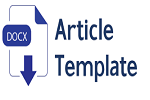Waqf Perspective of Islamic Law and Law in Indonesia
Abstract
This research aims to examine the concept and implementation of waqf according to the perspective of Islamic law and how it is regulated in the positive legal system in Indonesia. In Islam, waqf is seen as a charity whose rewards continue to flow as long as the benefits of waqf assets are still felt by the recipient. Meanwhile, in Indonesia, waqf is legally regulated through Law Number 41 of 2004 concerning Waqf and other implementing regulations. This research uses a qualitative method with a normative-juridical approach, namely examining the sources of Islamic law such as the Qur'an and Hadith as well as applicable laws and regulations. The results of the study show that the principles of waqf in Islamic law and laws in Indonesia have harmony, especially in terms of the eternity of waqf assets and their designation for the public good. However, there are some differences in terms of technical implementation and administration.
Keywords
Full Text:
PDFReferences
Abbasi, Muhammad Zubair. “The classical Islamic law of Waqf: A concise introduction.” Arab Law Quarterly 26, no. 2 (2012): 121–53.
Abdur-Rauf, Ibrahim Adeniyi, dan Engku Muhammad Tajuddin Engku Ali. “Waqf as a Poverty-Alleviating Instrument: Leveraging Shariah Governance Principles for Effective Implementation in Nigeria.” TWIST 19, no. 2 (2024): 628–38.
Alfina, K. N., A. S. K. Dewi, dan R. I. R. Sjafi’I. “Examining Legal Certainty in Online Cash Waqf: The Role of Witnesses in Indonesian Islamic Philanthropy.” Теоретическая и прикладная юриспруденция 24, no. 2 (2025): 9–23.
Anderson, J. N. D. “The Religious Element in Waqf Endowments.” Journal of The Royal Central Asian Society 38, no. 4 (1951): 292–99. https://doi.org/10.1080/03068375108731420.
Anuchiracheeva-Zamarripa, Jennifer. “A Qualitative Phenomenological Study of Adult School Counselors’ Importance and Influence in Supporting Adult Learners.” PhD Thesis, University of La Verne, 2024. https://search.proquest.com/openview/913fc8067ba7e13e88640ee4f52be306/1?pq-origsite=gscholar&cbl=18750&diss=y.
Ayub, Muhammad, Khurram Khan, dan Muhammad Ismail. Waqf in Islamic economics and finance: An instrument for socioeconomic welfare. Routledge, 2024. https://www.taylorfrancis.com/books/mono/10.4324/9781003477549/waqf-islamic-economics-finance-muhammad-ayub-muhammad-ismail-khurram-khan.
Creswell, John W., dan Cheryl N. Poth. Qualitative inquiry and research design: Choosing among five approaches. Sage publications, 2016. https://books.google.com/books?hl=id&lr=&id=DLbBDQAAQBAJ&oi=fnd&pg=PP1&dq=creswell&ots=-ir918MRVx&sig=tNz5z8VXFzzd5f4cdDUX4UCWYqQ.
Faisal, Ahmad, Imam Nur Aziz, dan Tufail Hussain. “Unveiling Waqf’s Role and Impact on Society Welfare: Deep Study from Indonesia.” International Journal of Islamic Finance 2, no. 1 (2024): 19–47.
Ghebrid, Sidali. “Waqf (Endowment) in the Maliki School and Algerian Law: Its Concept, Provisions, and Means of Preservation.” الصراط 27, no. 1 (2025): 355–74.
Jalili, Ismail, Muhammad Firdaus, dan AbdulGafar Olawale Fahm. “The Role of Qawā’id Fiqhiyyah in Strengthening Waqf Law: A Review of Challenges and Solutions in Indonesia.” Al-Qadhafi: Jurnal Hukum Islam Dan Perundang-Undangan 11, no. 2 (2024): 226–50.
Kahf, Monzer. “The role of waqf in improving the ummah welfare.” International Seminar on Waqf as a Private Legal Body 6, no. 1 (2003): 1–26. https://www.monzer.kahf.com/papers/english/ROLE_OF_WAQF_IN_THE_WELFARE_OF_THE_UMMAH.pdf.
Kamal, Mustafa, Hanafiyah Hanafiyah, Nainunis Nainunis, Safrizal Safrizal, Munawir Munawir, dan Saipul Bahri. “Method of Instinbāth Law of Money Waqf Abu Hanifah Immediate Perspective.” Budapest International Research and Critics Institute-Journal (BIRCI-Journal) 2, no. 1 (2019): 304–13.
Mahamood, Siti Mashitoh. “The legal principles of waqf: An analysis.” Jurnal Syariah 9, no. 2 (2001): 1–12.
Muksin, Agis. “Productive Waqf Management in Improving the Quality of Education in Rural Areas.” Global Business & Management Research 16, no. 2 (2024). http://gbmrjournal.com/pdf/v16n2s/V16N2s-70.pdf.
Nirmala, Rindang Dwi Putri, Amara Srie Adzantyassurya Qotrunnada, Elya Mahmada, Aanisah Nida Tahaanii, dan Karin Andhita Putri. “Legal Status of Profession Waqf from a Positive legal Perspective in Indonesia.” Journal of Law, Politic and Humanities 4, no. 4 (2024): 1085–91.
Nofianti, Leny, Murniati Mukhlisin, dan Andi Irfan. “Cash waqf innovation in Islamic financial institutions and its governance issues, case studies: Indonesia, Malaysia, Türkiye.” Journal of Islamic Accounting and Business Research, Emerald Publishing Limited, 2024. https://www.emerald.com/insight/content/doi/10.1108/jiabr-12-2023-0420/full/html.
Qamariyanti, Yulia, dan Muhammad Fikri Aufa. “Fuqaha and Positive Law Opinions on the Permanent Nature of Waqf Object Submission.” Notary Law Journal 3, no. 1 (2024): 48–65.
Ryandono, Muhamad Nafik Hadi, Tika Widiastuti, Dian Filianti, dkk. “Overcoming barriers to optimizing cash waqf linked sukuk: A DEMA℡-ANP approach.” Social Sciences & Humanities Open 11 (2025): 101588.
Salamah, Ade. “Optimizing Nazhir’s Role in Managing Waqf to Realize Economic and Social Development in Bekasi City.” Proceeding International Conference on Law, Economy, Social and Sharia (ICLESS) 2 (2024): 882–94. https://proceeding.icless.net/index.php/icless22/article/view/130.
Saputra, Wali. “Productive Waqf Accounting: A Systematic Literature Review of Financial Recording and Reporting Models.” Jurnal Ilmiah Literasi Indonesia 1, no. 2 (2025): 226–41.
Yusran, Qaid Qushayyi, dan Andri Nirwana. “The Practice of Changing the Status of Change of Waqf Property in the Islamic Social Economic View.” Journal of Ecohumanism 3, no. 6 (2024): 229–38.DOI: https://doi.org/10.24952/ejhis.v3i1.16169
Refbacks
- There are currently no refbacks.
Copyright (c) 2025 Syawal Siregar, Erwin Pane
Editorial Office:
Pascasarjana UIN Syekh Ali Hasan Ahmad Addary Padangsidimpuan;
Jl. T. Rizal Nurdin Km. 4,5 Sihitang 22733 Padangsidimpuan, North Sumatera, Indonesian.
Phone: (+62) 634 22080 Faximili: (+62) 634 24022 e-mail: elsirry@uinsyahada.ac.id
El-Sirry by Pascasarjana UIN Syahada is licensed under CC BY-SA 4.0




